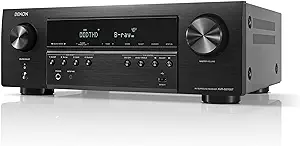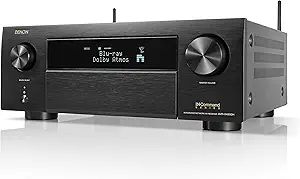The Sony AV receiver and the Denon AV receiver are two leading brands in the audio receiver category, each with their unique features and technologies. Sony's AV receivers are known for their innovative technologies like the Dolby Atmos, DTS:X, and their proprietary S-Force PRO front surround sound technology. They also feature High-Resolution Audio capability, which enhances the quality of sound, and 4K HDR pass-through, which ensures that the picture quality matches the sound. However, some users have reported that Sony's user interface can be difficult to navigate. On the other hand, Denon AV receivers are revered for their superior sound quality and high performance. They feature technologies like the Audyssey MultEQ XT32, which provides room acoustic measurement and DSP correction. Denon receivers also support the latest video technologies such as 8K/60Hz and 4K/120Hz pass-through, HDR10, Dolby Vision, Hybrid Log-Gamma, and BT.2020. They are also equipped with the HEOS Built-in technology for multi-room streaming. However, Denon receivers are generally more expensive than Sony's, which might be a deterrent for some users. Compared to other brands, both Sony and Denon have a solid reputation for delivering high-quality audio and video performance.
Key Features Comparison
Product Selection
Sony and Denon are two well-known brands in the audio equipment industry, each offering a range of AV receivers with varying features and capabilities. Sony's AV receivers are known for their high-quality sound, advanced features, and user-friendly interfaces. They offer a wide selection of models, from entry-level to high-end, to cater to different user needs and budgets. Sony's latest models come with innovative technologies such as Dolby Atmos, DTS:X, and 4K HDR pass-through, providing immersive audio and video experiences. However, some users have reported that Sony's AV receivers may lack the power needed for larger home theater systems. On the other hand, Denon's AV receivers are renowned for their superior audio performance and extensive feature sets. Like Sony, Denon offers a broad selection of AV receivers, from budget-friendly to premium models. Denon's latest AV receivers feature cutting-edge technologies such as HEOS multi-room audio, voice control compatibility with Amazon Alexa, Google Assistant, and Apple Siri, and support for 8K Ultra HD. However, some users have noted that Denon's user interface and setup process can be more complex compared to Sony. When compared to other brands, both Sony and Denon offer a wider product selection in terms of price range and features. However, the choice between the two often comes down to individual user preferences and specific needs.
Design/Look
Sony AV receivers are known for their sleek, modern design that fits well with most home theater systems. Their latest models, such as the STR-DN1080, feature a minimalist design with a matte black finish and a well-organized front panel that includes a large volume knob, a smaller input selector, and a few essential buttons. The display is clear and easy to read, showing relevant information without clutter. On the downside, some users may find the lack of physical buttons for advanced features a bit inconvenient, as they will have to navigate through the on-screen menu instead. On the other hand, Denon AV receivers, like the AVR-X3700H, have a more traditional design with a larger number of buttons and knobs on the front panel. They feature a brushed metal finish, giving them a solid, high-quality feel. The display is smaller compared to Sony's, but it is bright and provides all the necessary information. The additional buttons and knobs offer direct access to more features, which some users may prefer. However, this also makes the front panel look a bit cluttered, and the overall design may not be as appealing to those who prefer a minimalist aesthetic. Both brands offer high-quality design and build, but the choice between them will largely depend on personal preference regarding aesthetics and ease of use.
Affordability
Most affordable brands
When it comes to the aspect of price, Sony and Denon AV receivers offer different ranges that cater to various budgets. Sony AV receivers are generally more affordable, making them a popular choice for those who are budget-conscious or are just starting to build their home theater system. The latest models, such as the Sony STR-DH790, provide excellent value for money by incorporating features like Dolby Atmos, DTS:X, 4K HDR pass-through, and Bluetooth connectivity. However, the cheaper price point may mean compromises in certain areas, such as less power output and fewer HDMI inputs. On the other hand, Denon AV receivers, while generally more expensive, are recognized for their superior sound quality and advanced features. The Denon AVR-X3700H, for instance, supports 8K/60Hz and 4K/120Hz pass-through, has built-in Wi-Fi and Bluetooth, and offers voice control via Amazon Alexa, Google Assistant, and Apple Siri. It also has a higher power output and more HDMI inputs than most Sony models. However, these additional features and enhancements come with a higher price tag, which may not be within everyone's budget. Compared to other brands, both Sony and Denon offer competitive pricing, with Sony leaning towards the more affordable end and Denon catering to the higher-end market.
Quality/Durability
Sony and Denon AV receivers are both renowned for their quality and durability in the audio equipment market. Sony AV receivers, such as the STR-DN1080, are known for their robust build and innovative technologies like Dolby Atmos and DTS:X, which provide a high-quality, immersive audio experience. Sony receivers are also equipped with 4K HDR and HDCP 2.2 support for enhanced visual quality. However, some users have reported issues with the software interface, which can affect the user experience. On the other hand, Denon AV receivers, such as the AVR-X3600H, also offer high-quality audio and video performance. They come with features like HEOS wireless technology and voice control compatibility with Amazon Alexa, Google Assistant, and Apple Siri. Denon receivers are also known for their durability, but some users have reported issues with the setup process and the HEOS app's functionality. Both brands are highly competitive in terms of quality and durability, but the choice between the two often comes down to personal preference and specific feature requirements.
Reputation
Sony and Denon are two well-established brands in the audio equipment industry, each with their own distinct reputation. Sony AV receivers are known for their impressive sound quality, user-friendly interface, and advanced features such as Dolby Atmos support and 4K HDR pass-through. Sony's AV receivers also incorporate their latest technology, such as the Digital Cinema Auto Calibration (DCAC) for optimal sound, and the Music Connect feature that allows integration with home automation systems. However, some users have reported that Sony AV receivers can be prone to overheating and may lack the durability of other brands. On the other hand, Denon AV receivers have a reputation for their robust build quality, high power output, and exceptional audio performance. Denon AV receivers are equipped with the latest technologies like HEOS wireless multi-room audio technology, Audyssey MultEQ room correction technology, and support for high-resolution audio formats. They are also known for their extensive connectivity options, including HDMI inputs and outputs, USB ports, and Wi-Fi and Bluetooth capabilities. However, Denon's user interface and remote control design have been criticized as being less intuitive compared to Sony's. Despite this, both Sony and Denon AV receivers are highly regarded in the industry, each offering a unique set of features and technologies that cater to different user preferences and needs.
Conclusion
In the realm of audio receivers, both Sony and Denon AV receivers have carved out a niche for themselves with their distinct features and technologies. Sony AV receivers, for instance, are known for their high-resolution audio support and the latest Dolby Atmos technology, which provides a multi-dimensional and immersive sound experience. They also offer 4K HDR pass-through and HDCP 2.2 support for superior picture quality. On the downside, some users have reported that Sony AV receivers can be complex to set up and navigate, especially for those who are not tech-savvy. On the other hand, Denon AV receivers are lauded for their Audyssey MultEQ XT32 room correction technology, which optimizes the sound based on the room's acoustics. They also support the latest HDMI standards, ensuring compatibility with the latest TVs and digital projectors. Denon receivers are noted for their user-friendly setup and operation, with a clear and intuitive interface. However, some users have noted that Denon receivers can be more expensive than their Sony counterparts, which could be a deciding factor for budget-conscious consumers. In comparison to other brands, both Sony and Denon have a strong reputation in the audio receiver market, offering a range of models to suit different needs and budgets.




















